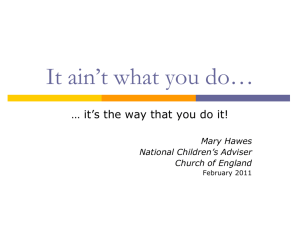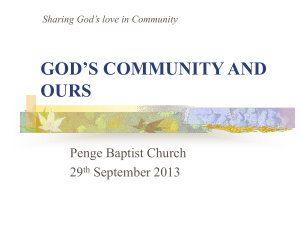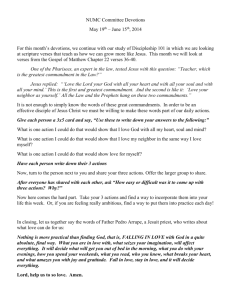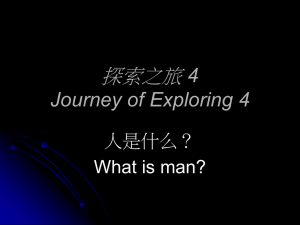2 A biblical perspective on the environment SECTION
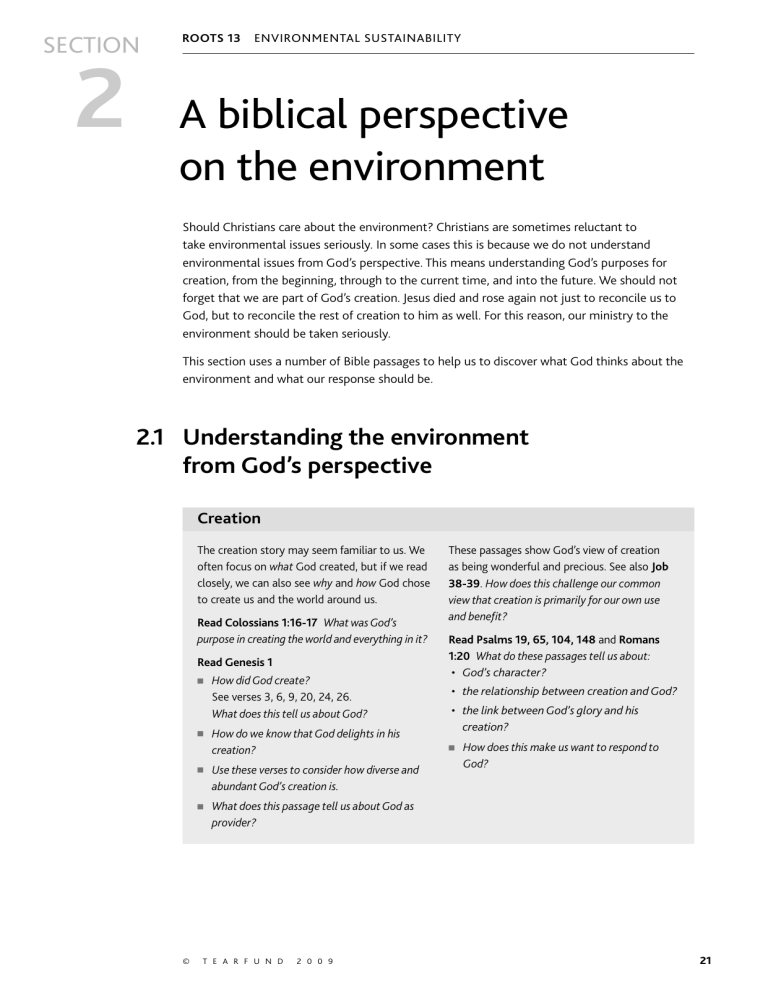
ROOTS 13 ENVIRONMENTAL SUSTAINABILITY
SECTION
2
A biblical perspective on the environment
Should Christians care about the environment? Christians are sometimes reluctant to take environmental issues seriously. In some cases this is because we do not understand environmental issues from God’s perspective. This means understanding God’s purposes for creation, from the beginning, through to the current time, and into the future. We should not forget that we are part of God’s creation. Jesus died and rose again not just to reconcile us to
God, but to reconcile the rest of creation to him as well. For this reason, our ministry to the environment should be taken seriously.
This section uses a number of Bible passages to help us to discover what God thinks about the environment and what our response should be.
from God’s perspective
Creation
The creation story may seem familiar to us. We often focus on what God created, but if we read closely, we can also see why and how God chose to create us and the world around us.
Read Colossians 1:16-17 What was God’s purpose in creating the world and everything in it?
Read Genesis 1
■ How did God create?
See verses 3, 6, 9, 20, 24, 26.
What does this tell us about God?
■ How do we know that God delights in his creation?
■ Use these verses to consider how diverse and abundant God’s creation is.
■ What does this passage tell us about God as provider?
These passages show God’s view of creation as being wonderful and precious. See also Job
38-39 . How does this challenge our common view that creation is primarily for our own use and benefit?
Read Psalms 19, 65, 104, 148 and Romans
1:20 What do these passages tell us about:
• God’s character?
• the relationship between creation and God?
• the link between God’s glory and his creation?
■ How does this make us want to respond to
God?
© T E A R F U N D 2 0 0 9
2 A Biblical perspective on the environment
ROOTS 13 ENVIRONMENTAL SUSTAINABILITY
The creation and role of human beings
Human beings are part of creation, but we have a unique role to play.
Read Genesis 1:26-28
■ What is special about God’s creation of human beings, compared with the rest of his creation?
■ What responsibility does God give to human beings, both men and women?
Depending on the Bible translation, these verses use commands such as rule over , subdue and have dominion . God gives human beings authority to care for his creation:
• Read Genesis 2:4-9, 15 How did God create the first human being? What is God’s intention for human beings? In Hebrew, the word for man is adam and the word for ground is adamah , to show our connection with the earth . How does understanding our connection with the world around us influence how we treat it?
• Read Psalm 24:1 Does God’s command to rule over his creation mean that we do it in isolation from him? Who is ultimately in charge? If we start to see creation as
God’s and not ours, how might we treat it differently?
• In Genesis 2:15 , God explains his command to us. Different Bible translations use words such as work, serve, keep, take care, look after, guard and tend. How can this verse be used to challenge the idea of selfish rule? Consider Philippians 2:5-7
• As we are made in God’s image, our rule should be modelled on God’s rule and reflect his character.
• As human beings we have kingly authority over the rest of creation but we are to exercise it as servants of our creator God and of the earth and its creatures that he has given us to rule over.
• We have seen already how God loves his creation, enjoys it and cares for it. If we love God, we should want to be like him and care for the things that he cares for.
■ Do we have the right attitude towards our role on earth as humans in relation to God’s creation?
■ Do our practices reflect this attitude? What can we do to take God’s command to care for his creation more seriously?
■ How could we respond to someone who thinks they have the right to exploit the earth’s resources?
■ Consider areas where people may be unaware that they are not caring for creation. How can we raise awareness?
Broken relationships
In the Garden of Eden God, humans and the rest of creation existed in perfect harmony.
Read Genesis 3:1-19 Due to human disobedience, relationships were broken. Look at what the passage says about how relation ships changed between:
• God and human beings
• God and creation
• Human beings and creation.
■ Consider how these broken relationships are displayed locally, nationally and at international level.
■ How do our own lives display these broken relationships? Is there anything for which we need to repent? Pray about it!
22 T E A R F U N D R O O T S R E S O U R C E S
2 A Biblical perspective on the environment
ROOTS 13 ENVIRONMENTAL SUSTAINABILITY
Restored relationships
Our attitude to creation should be affected not only by God’s original intentions for it, but also by God’s promises for the future.
Imagine having made something that you were proud of, and then someone comes along and breaks it. How would you feel?
What would your response be?
Amazingly, after people turned their backs on him and damaged what he had made, God had a loving attitude and sought to bring people back into a relationship with him.
Read Colossians 1:15-20 This passage talks about Jesus.
■ What is his role in creation?
■ What is his role in transforming broken relationships?
Read Matthew 27:51 and 28:1-2 Notice the connection between Jesus’ death and resurrection and the earth. As a result of Jesus’ death and resurrection, God’s whole creation is reconciled to him (Colossians 1:19-20). This will be fully achieved when Jesus comes again:
• Read Revelation 21:1, 2 Peter 3:13 and
2 Corinthians 5:17 Having dealt with sin and conquered death Jesus became the firstfruit of a new heaven and earth. The whole creation was renewed, is being made new and will be renewed through him.
• Read Romans 8:19-23 This passage refers to Genesis 3 when relationships were damaged as a result of human disobedience.
• Is the hope of creation for the future any different from our own?
• What will the whole of creation experience in the future?
• Is the groaning mentioned in verses 22 and
23 positive or negative? Consider the result of childbirth!
At the present time we live in a sinful world, so our relationship with creation is still damaged.
Read Matthew 6:9-13
■ What is God’s desire? (see verse 10) What does this mean?
■ How do we know this should be our desire?
(see verse 9a).
■ Should that desire be expressed in words only?
If not, how can we seek to see God’s kingdom on earth?
Our role at this time is not to wait passively but to work to see God’s kingdom come on earth. Until God makes everything perfect, we should follow God’s passion to see everything reconciled to him. This means that we should share the gospel with others, and model what it means to be in the kingdom of God that is here already, through good relationships with
God, other people, and creation. We should take seriously our responsibility to rule the earth and its resources well as we are commanded to do in Genesis 2:15. We can do this in the sure hope that everything will be made new when Jesus comes again.
A family giving thanks to God for their food.
© T E A R F U N D 2 0 0 9 23
2 A Biblical perspective on the environment
ROOTS 13 ENVIRONMENTAL SUSTAINABILITY
2.2 Understanding people from God’s perspective
Humans depend on God’s creation to survive. For example, we all need food to eat. The majority of the world’s population depend directly on the land for growing crops to eat or sell. People living in towns and cities may buy their food from shops or markets, but they still depend indirectly on the land and other resources for this food.
■ Make a list of aspects of God’s creation, such as land and water.
■ Some of these we call ‘resources’ because they are useful to us. Consider which of the aspects in the list are resources. Can you think of any more aspects of God’s creation that are not resources, but simply interesting or beautiful in their own right?
■ Consider which resources you depend on directly and which you depend on indirectly.
Sadly, humans do not have equal access to the world’s natural resources. Poverty means that some people are not able to access the resources, due to social or economic injustice. People who are rich often use more than their fair share of resources, and as a result, other people may suffer. One example of this is unmanaged deforestation for timber production which displaces people and destroys biodiversity. Another example is the use of fossil fuels, mainly in the richer
North, which have made a large contribution to global climate change. Climate change is already impacting poor people the most.
Learning from Old Testament law
3
In the Old Testament we read that God laid down a set of laws so that the Israelites would be responsible to God for the land he gave them to live on and for each other.
Responsibility to God This included tithing and offering the firstfruits of the harvest to God
(Exodus 23:14-19). Leviticus 25:23 is a reminder of God’s ultimate ownership of the land and authority on how it should be used: ‘ The land must not be sold permanently, because the land is mine and you are but aliens and my tenants .’
Responsibility to others This included letting the land rest and enabling others to enjoy it (Exodus 23:10-11), and enabling the poor to gather the gleanings of the harvest
(Leviticus 23:22) and to benefit from the tithes
(Deuteronomy 14:28-29, 26:12) in certain years. To stop people becoming wealthy at the expense of others, God did not allow land to be sold permanently. Instead, during the year of
Jubilee (every 49 years), land which had been sold was to be returned to the original owner.
This ensured that future generations had access to land. It also meant that the price of land decreased as the Jubilee year approached, so that nobody was taken advantage of (Leviticus
25:14-17). Although these laws are to be put into practice in certain years (Deuteronomy
15:1-11), God calls us to have a good attitude towards poor people all the time.
■ What do these passages tell us about:
• the equal value of people?
• the importance of not accumulating too much personal wealth?
• the importance of relationships within the community?
• the importance of rest for people and the earth?
■ What practices or systems exist today that work against these principles?
■ What can we do about it – personally and organisationally? What practical action can we take? Is there any advocacy work that we should do?
3 Based on C Wright (2004) Old Testament Ethics for the People of God , IVP
24 T E A R F U N D R O O T S R E S O U R C E S
2 A Biblical perspective on the environment
ROOTS 13 ENVIRONMENTAL SUSTAINABILITY
Learning from the teaching of Jesus
There is a lot to learn from Jesus’ teaching in the New Testament about our responsibility to each other.
Read Mark 12:28-31
■ We would not want to be treated unjustly, so what does it mean to love someone who is being treated unjustly? What kinds of injustice do people experience today? What kinds of injustice related to environmental issues do people experience today?
■ How do we contribute to this injustice?
Consider whether our lifestyles are contributing to climate change. What attitude do we have towards our natural environment?
■ How would Jesus want us to respond?
Read Luke 10:25-37
■ Who is our neighbour?
■ In terms of the environment, who is our neighbour?
■ What are the consequences of environmental degradation for people around the world and for future generations?
■ What action can we take to ensure that we can provide for everyone’s present needs in a way that will ensure that the needs of future generations are met?
There is much that we can do to put our biblical understanding of God’s creation and our role in caring for it into action in our work practices and in our own lives. Christians do not care for the environment purely for practical reasons, or for humanitarian reasons. We are also motivated by the desire to love, understand and protect the environment in order to glorify our creator God.
Sometimes caring for the environment and the needs of others can be costly. We may discover that there is little that we can do ourselves, and our efforts may seem fruitless against the size of the environmental problems that exist. Here are some issues to consider at such times:
■ God is in control (Psalm 46).
■ God has commanded us to live this way (Genesis 1:28; Mark 12:28-31).
■ We will be rewarded for our efforts (Colossians 3:23-24).
■ God wants to help us. We should pray about the issues we face (Luke 11:1-10).
Sections 5 will help us to understand the need to ensure environmental sustainability in our work and provide us with a tool that can help us. Section 6 will help us to put our beliefs into practice through advocating for a more just approach to the present and future use of environmental resources.
REFLECTION ■ Having studied the Bible passages in this section, have we learnt anything new? How have our views of the environment been challenged?
■ How could we use these passages to inspire others – at national or local church level, or with our Christian friends?
© T E A R F U N D 2 0 0 9 25
2 A Biblical perspective on the environment
ROOTS 13 ENVIRONMENTAL SUSTAINABILITY
26 T E A R F U N D R O O T S R E S O U R C E S


